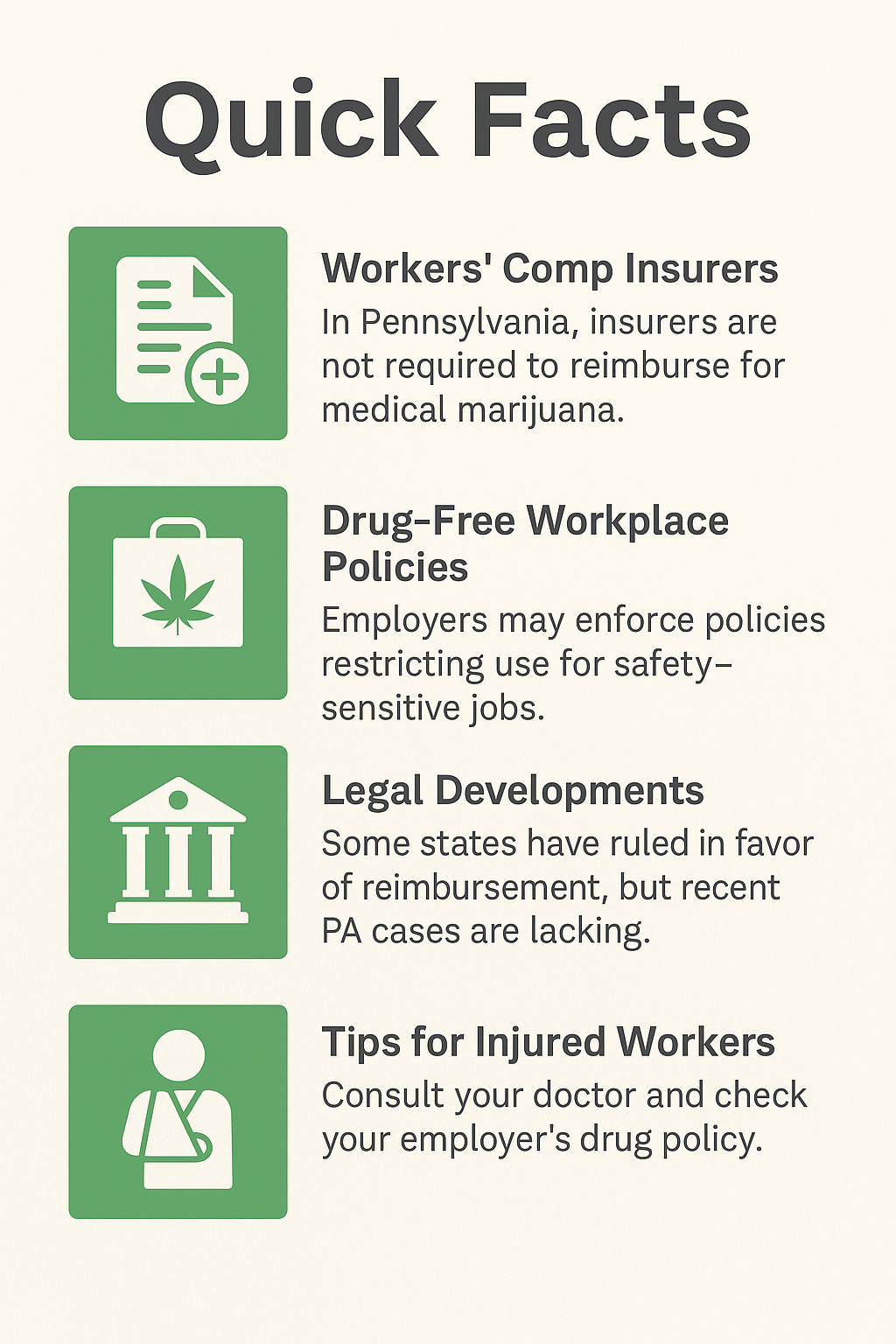Since Pennsylvania legalized medical marijuana in 2016, more injured workers have considered it as an alternative to prescription opioids for managing chronic pain from workplace injuries – and for a good reason.
With its potential to reduce dependency on addictive medications, cannabis has become a preferred option for some patients – especially those dealing with long-term musculoskeletal injuries, nerve pain, or other difficult-to-treat conditions.
However, when medical cannabis use intersects with the Pennsylvania workers’ compensation system, things get complicated. While state law recognizes marijuana as a legal treatment for qualified patients, workers’ comp laws and insurance coverage rules have yet to fully catch up.
That’s why, if you’re exploring medical marijuana to manage pain from a workplace accident or nerve damage linked to a brain injury, guidance from an experienced lawyer in Philadelphia or Allentown, PA, is essential.
Is medical marijuana covered by insurance in Pennsylvania?

At present, Pennsylvania law does not require workers’ compensation insurance carriers to reimburse the cost of medical marijuana. This is largely due to marijuana’s classification as a Schedule I controlled substance under federal law.
Because of this federal prohibition, many insurers argue that covering medical marijuana would place them at legal risk.
Pennsylvania courts have not yet issued a definitive statewide ruling compelling insurers to pay for cannabis in workers’ comp cases. While a handful of states like New Jersey, New York, and New Mexico have seen rulings in favor of reimbursement under certain conditions, Pennsylvania remains in a legal gray zone.
The practical outcome? Injured workers who want to use medical cannabis for pain management often have to pay out-of-pocket – even if it’s recommended by their physician as part of the workers’ comp treatment plan.
Drug-free workplace policies vs. medical cannabis rights
Another challenge is the potential clash between employer drug-free workplace policies and a worker’s legal right to use medical marijuana under state law.
While Pennsylvania’s Medical Marijuana Act protects registered patients from certain forms of discrimination, it also allows employers to prohibit employees from performing tasks that could pose a safety risk while under the influence – such as operating heavy machinery or working at heights.
This creates a delicate balance for injured workers:
- If they are still employed while recovering (standard or light-duty work), a positive THC test could lead to job restrictions or even termination, depending on workplace policy.
- If they are on total disability benefits and not actively working, the issue is less about safety and more about whether the treatment will be covered.
Navigating these policies often requires clear communication with both the employer and the treating physician, as well as careful compliance with Pennsylvania’s medical marijuana regulations.
Recent legal developments & potential changes
While Pennsylvania courts have not mandated reimbursement for medical cannabis in workers’ compensation cases, the topic is gaining attention. Legislators and advocacy groups have discussed proposals to expand coverage for alternative pain management options, including marijuana.
Nationally, several cases have set important precedents:
- In New Jersey, courts have ruled in favor of reimbursement for medical marijuana in certain workers’ comp cases.
- In New York, the Workers’ Compensation Board allows reimbursement under specific medical guidelines.
Although these rulings are not binding in Pennsylvania, they could influence future legislative or judicial decisions here – especially as more evidence emerges about cannabis’s role in reducing opioid use and improving quality of life for chronic pain patients.
Practical advice for injured workers considering medical marijuana
If you are an injured worker in Pennsylvania and are thinking about using medical marijuana as part of your recovery:
- Get a valid medical marijuana card from a certified physician under the state program.
- Discuss your treatment plan with your workers’ comp doctor to ensure it’s documented in your medical records.
- Check your employer’s drug policy to avoid unintentional violations.
- Understand the costs – you may need to pay for the treatment yourself unless future legal changes mandate reimbursement.
- Consult an experienced workers’ compensation attorney to learn about your rights and how to navigate potential disputes.
Could a brain injury lawyer in Philadelphia & Allentown, PA, help you access medical marijuana benefits?

The use of medical marijuana in Pennsylvania workers’ compensation cases remains an evolving and unsettled issue. While cannabis is legal for qualifying patients under state law, insurers are not currently required to pay for it, and drug-free workplace rules can complicate matters further.
As court cases and legislation continue to shape this area of law, injured workers seeking safer, non-opioid pain relief should stay informed and seek legal guidance. With the right approach, you can protect both your health and your benefits while navigating this hazy legal landscape.
If you’re in the Hamilton District of Allentown or anywhere in eastern Pennsylvania, don’t navigate these challenges alone. Liberty Bell can help you understand your rights, clarify common work comp myths and misconceptions, and guide you through complex brain injury claims involving medical marijuana.
Reach out today, get informed, stay protected, and secure the benefits you deserve!





